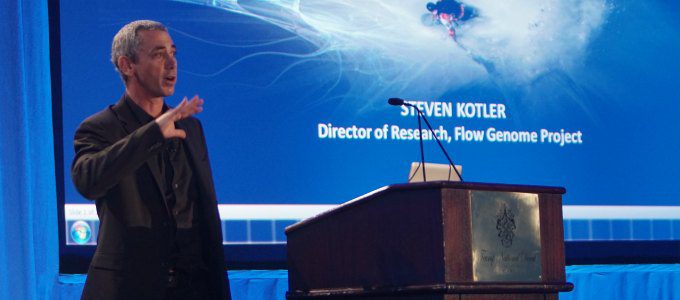Steven Kotler presents on flow as the first keynote presenter at Spring 2015's CLO Symposium. (Photo by Will Byington Photography)
Day one of the Spring 2015 CLO Symposium is wrapped up, which means we’ve got a great day of content and inspiring ideas behind us (and a rap on learning and development by traveling comedy group Second City!) but only two more days left.

Do we have to leave Miami on Wednesday? Can we take the heat and lively audience discussions with us? While I’m going to make the most of the upcoming keynotes, panels, power hours and workshops, I want to share a few nuggets of what we heard on day one during Steven Kotler’s keynote on decoding the science of ultimate human performance and editor Kellye Whitney’s panel on the future of leadership development — two topics that resonate well with learning professionals’ everyday goals and challenges.
Kotler’s story was such an inspiring one. He’s a Los Angeles-based journalist who had Lyme disease nearly 20 years ago, and the doctors who examined him couldn’t provide a cure. He had it for years and was bedridden for months, until a determined friend dragged him out into the ocean one day to catch a few waves. After about 30 seconds in the water, Kotler’s muscle memory kicked in, his senses heightened and he felt as if he had entered another dimension. He rode his first wave in years and then did it four more times. How? Flow.
Kotler says flow is an optimal state of consciousness, when you feel and perform your best. It’s a moment of total absorption. Time speeds up or slows down like a freeze-frame effect. The brain takes in more information per second, processing it more deeply. It’s similar to a runner’s high.
After that day Kotler embarked on quest to figure out what was happening and discovered 150 years of research on flow. It’s interesting stuff and not limited to individual performance. That fact was a great transition to our panel with learning leaders from AT&T, Harvard University, Aon and UCLA, who discussed the future of learning and development and how to get academic institutions to better serve corporate learning departments. How can we have a state of flow together? Below are some tweets from editor Kate Everson that summarize the session.
.@huntlambert: "We (Harvard and other universities) don't know how to connect with you, and that's a huge problem."
— Kate Everson (@EversonKate) April 13, 2015
.@aaronkolson "We need the kind of thinking skills & knowledge developed in a university, we just need it packaged differently." #CLOsym
— Kate Everson (@EversonKate) April 13, 2015
Smutz: Leaders have to help orgs deal with constant change so it's seen as not good or bad, but rather the way of the world. #CLOsym
— Kate Everson (@EversonKate) April 13, 2015
Some great stuff on day one, and we’re not nearly done yet! Check back on CLOmedia for more video and blog recaps, and follow us on Twitter @CLOmedia and use/follow the hashtag #CLOsym for updates.















